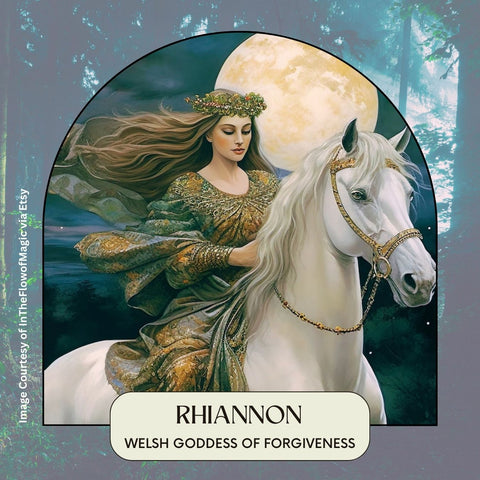Rhiannon: Welsh Goddess of Forgiveness

A long, long time ago, when the trees and mountains spoke to people, when the springs rose straight from the cold rock; and gods, and goddesses walked through the land and whispered in the kingdoms of our heart, Rhiannon appeared on her white horse upon the mounds of Goredd Aberth.
Now, this mound was what we call “thin” because when you stood upon it, there was very little separation between the world of our senses and the other worlds. Few people dared to tread upon this ground. Yet here she was, dressed in brocades of gold and silk, face covered with dew, glistening in the golden sun light.
She had decided not to marry her own kind, but to come to the world of human beings. King Pwyll watched her, struck down by love. He had to have her. He called out for the very best of his horsemen to bring her to him. His servant started the chase on the finest horse in the kingdom, thundering through the fields and forests after Rhiannon, who simply turned her mare and began an easeful trot.
Some say that her horse’s feet never touched the ground, that it moved like shimmering light, always remaining just out of reach. She appeared again on the hill the next day and the day after that. Pwyll fell on his knees, called out for her, his agony echoing in the mountains and canyons. She turned now, for she had always loved him but would not be taken by force. “It would have been kinder for the horse,” she teased, “if you had just called for me the first time we saw each other.”
She was seeking him as her husband. But now, having agreed to marry him, he was told to wait a full year before she disappeared into the mist with him. A year later she appeared on the mound, as beautiful as ever, and bade Pwyll and his entourage to follow her through the forest, where even the trees and rivers parted to make way for the wedding party. They arrived at a lake which reflected the entire universe. Beside it was her father’s palace made of crystal, with spires that reached into the heavens. There, they were wed. When she returned to take her throne at Wales, the forest sealed up behind her.
She knew that she would never be able to go back to the world in which she grew up. Yet the people loved her. During the day, the birds sang the most exquisite songs wherever she walked. At night, the moonlight followed her around, clothing her beauty. In the third year, she gave birth. The room was full of light. The divine child emerged to grace the world. Water from her womb left its moist trail, filling the cracks between the stone of the castle floor. She rested in bed, slept long and deep, woman and goddess, muscle and bone sinking into the tranquility of surrender.
The women in waiting, all six of them, cared for her, protecting her while she rested. Yet one evening, they all fell asleep and when they awoke, the baby was gone. Panicked, they grabbed a puppy and pulled him into the corner of the courtyard. They cut its throat, gathering its blood in a golden cup, which they smeared on Rhiannon’s lips, face and neck. The castle echoed with their horrific screams. Rhiannon, they said, had taken her child, chewed him up and swallowed him bit by bit. Pwyll arrived in the room. Saw the blood spattered on his wife’s body. A raging crowd gathered around the castle, demanding justice.
They had waited three years for an heir to the thrown, and now, infanticide and cannibalism. Rhiannon, weak in bed, swore her innocence. Pwyll, broken in grief, confronted by the anger of his counsel and people, did not strongly defend her. Nor would he divorce her. He asked for her life to be spared. The punishment was given.
For the next seven years, Rhiannon was to sit in front of the castle gate, wearing a horse collar. She was to greet the guests by telling her story and offering to carry them to the castle. Over the years, she bore her penance without complaint, accepting her fate, though few asked her to do the task. Throughout the country, word began to spread of her quiet dignity.
The people began to question whether she was actually guilty. Then, one day, a noble heard of the story and came to visit, carrying a child. He met her outside the castle wall. She was bent low under the yolk. He held up a piece of tattered golden cloth. Rhiannon recognized it. She had woven it for her baby! She bent down and pulled the covers away. Immediately she recognized the child as her own. He had the eyes of her husband, Pwyll’s. Some say that years before, the baby was taken by a suitor that Rhiannon had forsaken.
He had been found at the stable of Teyrnon, the Lord of Gwent, who had heard crying as a mare was giving birth. The baby had been named Gwri Wallt Euryn (Gwri of the Golden hair). Years later, he became a great king. Though Rhiannon had suffered tremendously, she forgave her attendants.
Today, even now, she is known as goddess of forgiveness and understanding who remains strong and steadfast in times of great change, loss, crisis, and betrayal in marriage. When love is taken away, or when you are accused or wronged, remember to call upon Rhiannon.












4 Comments
Beautiful.
Beautiful.
Beautiful.
Beautiful.